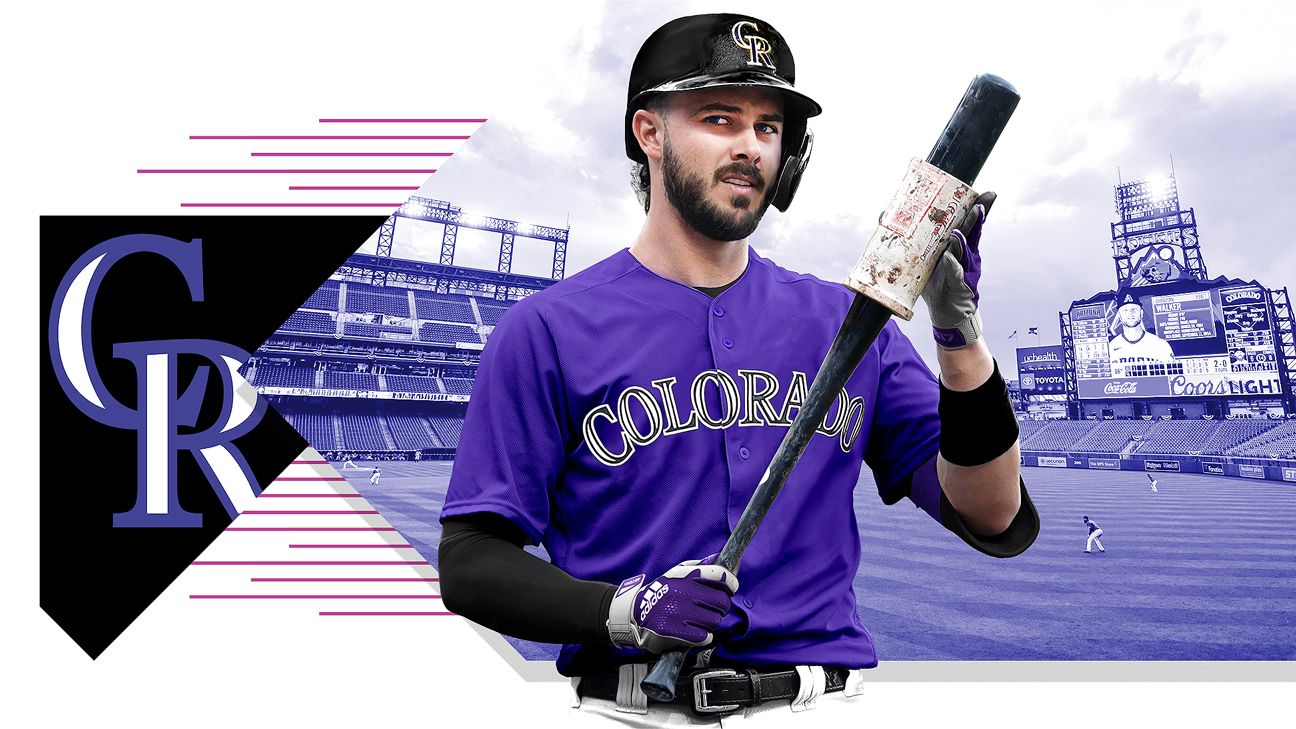Hold on, let me readjust my projections … nope, the Colorado Rockies still aren’t the favorites to win the National League West.
It’s been a wild, sometimes bumpy ride for Kris Bryant to free agency — one that includes an MVP award and a World Series title in his sophomore season in 2016, a lost grievance against the Chicago Cubs for manipulating his service time, injuries along the way and a bounce-back season in 2021. I’m not sure he envisioned it would end up with him signing with the Rockies. But that’s where he is going after sources told ESPN he inked a seven-year, $182 million contract — the second biggest in Rockies history, behind Nolan Arenado‘s deal, and easily the biggest they’ve handed out to a free agent, surpassing the $121 million they signed Mike Hampton for back in 2001.
The team is a little bit of surprise given the Rockies finished 32.5 games behind the San Francisco Giants last season, but Bryant’s market always was going to be difficult to predict. And that market got thinner after the Philadelphia Phillies and Seattle Mariners, two potential landing spots, filled offensive holes with Kyle Schwarber and Jesse Winker. Given his options, Bryant did surprisingly well to get this deal; predictions for his contract back in November ranged from five years/$90 million (ESPN’s Kiley McDaniel) to six years/$160 million (MLB Trade Rumors) to eight years/$200 million (FanGraphs), so this is right there at the top end. Of course, as the biggest Rockies fan I know texted me, “The Rockies only bid against themselves.” (See: Charlie Blackmon and Ian Desmond.) But what other teams were realistically left in the Bryant market? Maybe the Giants, who saw Bryant up close the final two months last season; but it’s not in Farhan Zaidi’s makeup to give that kind of money to a 30-year-old position player with some potentially problematic metrics.
My concern about Bryant’s future revolves around some of those deep metrics. His exit velocities are decidedly non-elite (42nd percentile hard-hit rate in 2021, 29th percentile average exit velocity). That still translated to 25 home runs in 2021, in part because of better-than-average contact rates and a fly ball-oriented launch angle. Bryant’s Statcast defensive metrics also were poor overall, with an outs above average rating at the bottom of all players — the first percentile. While he played all over the field, maybe that hurt him. His metrics were poorest at third base and right field (especially while with the Giants, where there’s a lot of ground to cover). His speed, as you would expect given his age, also is starting to decline; he was in the 91st percentile in 2017 but was down to the 71st percentile last season.
While the Rockies might view his defensive versatility as a plus, I think at this point in his career it would be to Bryant’s benefit to play one position. With Ryan McMahon crushing it on defense at third base in 2021, that should probably be left field. Raimel Tapia and his 80 OPS+ should hardly be a roadblock to playing Bryant there on a regular basis. The other option would be first base, with C.J. Cron moving to DH. But I don’t like the idea of paying Bryant $180 million to play first base, where his bat is only a little better than an average first baseman’s (.834 OPS in 2021 versus .792 for first basemen) — and that’s right now, let alone in years five, six or seven of this deal.
OK, I’m probably a little too pessimistic here. This is really the first time the Rockies have brought in a proven star-level hitter since … who, Larry Walker? And it will be exciting to see what the Coors Effect does to Bryant’s numbers; if you’re a fantasy player, Bryant’s value just took a huge leap. (For what it’s worth, Bryant has a career. 757 OPS at Coors Field, but that’s pretty meaningless since he has somehow played just 16 games there.) Bryant is a good player who gets on base, hits for power and does give you that defensive flexibility. Take out 2020 and he has been pretty consistent: 121 OPS+ in 2018, 132 in 2019 and 124 in 2021. He isn’t the MVP-level player he was in 2016 and 2017, but 3- to 4-WAR players don’t grow on trees and, with better defense, maybe we’re looking at a 4- to 5-WAR player.
The immediate issue here is if the Rockies can’t compete with the Los Angeles Dodgers — or maybe even the Giants and San Diego Padres in 2022 and 2023 — where does that leave this contract over the final five years, when Bryant might start declining? It’s good to see the Rockies joining the free-agent frenzy, but like many of their recent “big” signings — Blackmon, Desmond, that year they signed all those relievers — I’m skeptical this is going to work out (let alone that for $180 million I’d rather have Trevor Story). Bryant’s best value was to a team with a chance to win over the next three seasons; that’s unlikely to be the Rockies. But, hey, at least the owners are spending!
